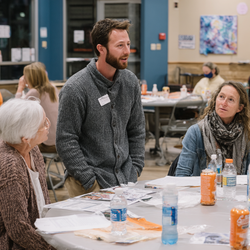I'm sitting here looking at this pile of leftover flyers from our Halloween event. Spent probably two hours making them perfect. Nice colors, cute fonts, all the details lined up just right.
Used maybe ten of them.
The rest are going in the recycling bin with all my other beautiful, unused promotional materials from the past three years. There's a whole graveyard of perfectly designed flyers in my desk drawer.
But our Halloween party was packed. Go figure.
That Time I Accidentally Promoted the Wrong Event
So last month I'm rushing around Sunday morning trying to get the weekly email sent out before service starts. Racing through the announcements, typing fast, not really paying attention.
Sent an email to sixty families about our upcoming "Pizza Party" on Wednesday night.
We were having a prayer meeting. Not pizza.
Didn't realize my mistake until Monday when Sarah's mom texted asking what time the pizza started and should she bring drinks.
Then Emma's dad asked if it was potluck style or if pizza was provided.
By Tuesday I had seven families asking about this pizza party that didn't exist.
What was I supposed to do? Tell a bunch of kids there's actually no pizza, just prayer?
Bought six pizzas. Had an impromptu pizza party Wednesday night in the fellowship hall. Best turnout we'd had for a midweek event in months.
Sometimes my biggest failures turn into accidental successes.
But it made me think - why did everyone get excited about accidental pizza but ignore the carefully planned stuff? Kids hear "pizza party" and immediately start working on their parents. They hear "family fellowship dinner" and suddenly have homework they forgot about.
Words matter. Who knew?
The Bulletin Board That Nobody Reads
I used to think bulletin boards were important. Made these elaborate displays, rotated information regularly, even laminated things so they'd look professional.
Last Sunday I decided to actually watch and see who reads our main bulletin board.
Stood there for twenty minutes during fellowship time. Watched maybe thirty people walk past it.
Zero people stopped to read anything. Zero.
But later I overheard two moms talking about whether to bring their kids to family game night. They knew all the details. Got everything from their kids, not from any bulletin board.
That's when I realized something obvious that I'd been missing for years - adults don't read church bulletin boards any more than kids read school bulletin boards. Even when the information they need is right there.
So I stopped putting important stuff on bulletin boards. Started sticking announcements in places where parents actually look.
Like taped to the bathroom mirror where moms are trapped waiting for their three-year-old to wash hands for the fifteenth time.
Or next to the coffee station where tired parents are desperately trying to caffeinate before dealing with their children for the rest of Sunday.
Places where people can't avoid seeing information because they're stuck standing there anyway.
And I simplified everything. Instead of paragraph descriptions of events, three lines max. Big letters. Date and time. Done.
Turns out nobody wants to read essays about family fun night when they're just trying to get coffee.
Text Messages: The Good, The Awkward, and The Regrettable
Texting seemed like such a smart idea. Direct communication! Instant delivery! Modern and efficient!
Then I sent Mike this message: "Don't forget about Saturday! The kids will love it!"
He texted back: "What's Saturday?"
I had no idea what I meant either. In my head, obviously everyone knew we were talking about the fall festival. In reality, I sounded like someone having a breakdown.
Now I over-explain everything in texts, even when it makes me sound repetitive. "Fall festival this Saturday at 6 PM in the fellowship hall with games and food" instead of mysterious references to "Saturday."
But personal texts work when you connect them to specific kids. "Tyler's been practicing his yo-yo tricks all week - Saturday's carnival would be perfect for showing off!" That dad knows exactly why his kid would want to come.
Group texts are dangerous though. Send one announcement to twenty parents and you get everything from thumbs up emojis to complete silence to that one mom who accidentally sends her grocery list to everyone.
"Milk, bread, pick up dry cleaning, call dentist about Emma's appointment."
Every time. There's always someone who hits reply all by mistake.
Facebook: Where Good Intentions Go to Die
Posted about spring carnival six weeks early. Felt very organized and professional.
Got three likes. Church secretary, my sister who lives in Ohio, and someone I didn't recognize who might have clicked by accident.
Tried posting at different times. Tried different wording. Tried adding hashtags because apparently that's a thing people do.
Nothing worked until I accidentally figured out that people care more about pictures than announcements.
Posted a photo from last year's carnival with "Who remembers this?" as the caption. Got fifteen comments and suddenly twice as many people saw the post.
People like seeing their kids having fun more than they like reading about future opportunities for fun. Makes sense when you think about it.
So now I ask questions in posts. "What was Marcus's favorite game last year?" "Which booth should we definitely bring back?" Gets people commenting and the Facebook algorithm or whatever decides more people should see it.
Although sometimes this backfires spectacularly. Asked what snacks people wanted for movie night and got seventeen different suggestions including one very detailed comment about gluten-free options and another suggesting we switch to a potluck format entirely.
Simple question, complicated answers. Should have seen that coming.
Kids Are Sneaky Good at This
Tyler comes up to me three weeks ago and says, "My mom wants to know if she can help with the next event."
We hadn't announced anything yet. Hadn't even decided what the next event would be.
Turns out Tyler overheard me mention to Linda that we were thinking about doing family game night. Went home and told his mom, who got excited and started planning how she could contribute.
Kids hear everything. Remember the stuff that sounds interesting. Forget the stuff that sounds like work.
Now I mention upcoming events during regular class time. Not as formal announcements, just casual conversation. "I wonder who's going to be brave enough for the pie-eating contest next month."
Gets kids asking questions. They go home with information to share, but it doesn't feel like homework.
You have to be careful what you say though. Mentioned we might rent a bounce house for summer kickoff and that became absolute fact in kid world. Had three parents asking about setup times for equipment I wasn't sure we were even getting.
Ended up renting the bounce house because telling excited kids "never mind" is harder than spending money.
When Everything Conflicts with Everything Else
Planned our biggest family event for homecoming weekend. Half our families have teenagers. Homecoming is not optional.
How did I miss that? Checked church calendar, school calendar, even looked at community events.
Completely forgot that high school social events trump church activities in teenager world.
Started keeping what I call my "master calendar of doom" after that. School stuff, sports schedules, holidays, testing weeks, even random things like when report cards come out because stressed parents don't want extra commitments.
But here's the thing - there's always something conflicting with something else. Baseball overlaps with dance recitals. Family vacations happen during vacation Bible school week. Work conferences land on the same weekend you've been planning an event for months.
Can't avoid every conflict. There are only fifty-two weekends in a year and approximately three hundred things competing for them.
Best solution I found was asking families about scheduling before committing to dates. Email three options, ask which works better. Takes longer but beats planning something nobody can attend.
Though asking for input creates new problems. Give people three choices and someone suggests a fourth option that doesn't work for anyone else. Give them two choices and they ask why you didn't consider the obvious third option.
No winning. But at least you can avoid scheduling during state championship playoffs.
Personal Conversations Beat Everything Else
Mass emails disappear into the void. Personal invitations get responses.
Started making it my goal to talk to specific families about specific events. Not generic "hope to see you there" stuff, but targeted invitations based on what I know about their kids.
"Emma would love the art station we're setting up." "Marcus has been wanting to show off those card tricks - game night would be perfect."
Takes way longer than sending one email blast to everyone. But people actually show up.
Problem is you have to know families well enough to make connections. Can't invite Emma to show off card tricks if Marcus is the one who does magic and you've got them mixed up.
I try to keep mental notes about kids' interests and family situations. Although writing real notes works better because my memory is garbage and I once invited the same family to four different events in one conversation because I kept forgetting I'd already asked.
They said yes to everything, which was sweet but made me realize I should probably spread invitations around more.
What People Actually Notice
Handwritten notes get read even when my writing looks like a caffeinated squirrel did it.
Stuff on car windshields gets attention but also makes people mad. Found this out when someone called the church office to complain about "solicitation" in the parking lot.
It was information about vacation Bible school.
Kids carrying messages home works great until they lose the paper or give it to the wrong family or completely forget what they were supposed to remember.
But honestly? Best promotion is still people telling other people about fun they had. One family mentioning to another family how much their kids enjoyed an event gets better results than any flyer ever will.
Which means the most important promotion strategy is making events actually worth talking about afterward.
Revolutionary thinking, right?
Resources That Don't Make Things Harder
Some curriculum companies actually help with promotion instead of just adding to your workload.
Kids Sunday School Place has templates that don't require design skills. Orange has realistic family communication ideas.
Group's DIG IN includes promotion help with their events. Gospel Project has practical family engagement suggestions.
Grow Curriculum approaches family connection differently than traditional resources, which works if your parents are comfortable with technology and social media.
But honestly, best resource is other churches who've figured out what works locally. Steal their successful ideas. No point recreating solutions when someone else already solved the problem.
What I Actually Know About People
Families come to events where kids will have fun and parents feel comfortable. That's basically it.
Marketing tricks don't fix boring events. Beautiful flyers can't save awkward social situations.
Clear information helps. Multiple reminders help. Personal invitations definitely help.
But good events help most.
People show up for things their kids enjoy and where they feel welcome. They skip stuff that feels like obligations or where they worry about fitting in.
So promotion matters, sure. But what you're promoting matters way more.
Create something worth attending and people find ways to be there. Plan something forgettable and no amount of perfect communication saves it.
I still make flyers sometimes. But I spend more time planning events kids actually want to attend and parents feel good about attending.
Better promotion than anything printable.








